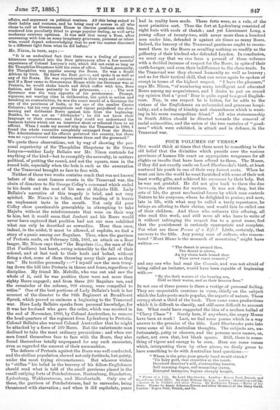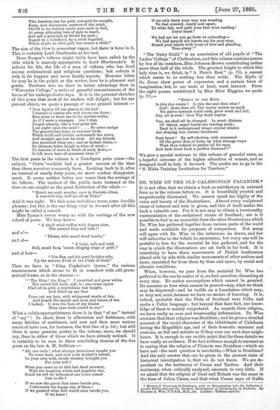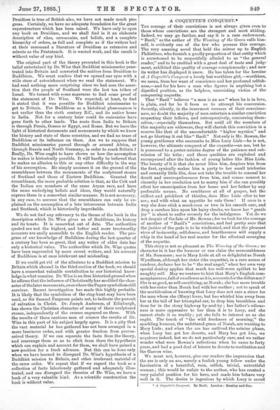FOUR VOLUMES OF VERSE.*
ONE would think at times that there must be something in the old belief that the divinities which preside over the various provinces of human life exact an appropriate vengeance for all slights or insults that have been offered to them. The Muses, if they did not exactly smile on Lord Sherbrooke's birth, at least nurtured his youth in one of their very fairest seats. When he went out into the world he went furnished with some of their not least worthy gifts, and achieved his successes by their help. But he was not grateful. He did not give back to them the due 1,:iEwrn,oice, the returns for nurture. It was not they, but the arts of life, the great mechanical forces by which man controls Nature to his purposes, whom he delighted to praise ; and now, late in life, with what may be called a tardy repentance, he brings an offering to their shrine, and would fain be called one of their children. And those who estimate this offering, all who read this work, and still more all who have to write of it without infringing the respect due to a great name, feel that the punishment is curiously appropriate and complete. For what are these Poems of a Life ? Little, certainly, that answers to the title. Any young man of culture, who remembered "Mont Blanc is the monarch of mountains," might have
written :—
"The desert is around thee, The desert is above, An icy chain bath bound thee Thou never canst remove
and any one who had read the Corsair, and was not afraid of being called an imitator, would have been capable of beginning with:—
"By the dark waters of the heaving sea, Cold as their waves, and as their breezes free."
In not one of these poems is there a vestige of personal feeling. They are respectable exercises in verse, chiefly on the subject which the Lake poets made popular, the aspects of nature. These occupy about a third of the book. Then come some productions which it is difficult to classify, and still more difficult to account for. What could have suggested the idea of a modern ballad of "Chevy Chase"? Surely here, if anywhere, the angry Muses have been at work ! Last, we find some poems which in a way answer to the promise of the title. Lord Sherbrooke puts into verse some of his Australian thoughts. The subjects are, unfortunately, petty or obscure, and the persons mere names, or, rather, not even that, but blank spaces. Still, there is something of vigour and energy to be seen. Here are BOMB verses which, interpreting them by other pieces, we dimly guess to have something to do with Australian land questions :— "Where is the prize your greedy band would clutch ? 'Tis fairy gold, that crumbles at the touch. Deceived deceiver's self, o'erreaching knaves, Self-cozening dupes, self-manacling slaves, Betrayed betrayers, buyers cheaply bought,
Who freedom lost for gold, and gold for nought, Keen, nice discerners, masters of the mind, SkiII'd in its darkest nooks your ends to find, At every glittering lure of gain to reach, And sell a principle or friend for each ; Duped by a falsehood, by a trick beguiled, Which might an idiot gall, bat scarce a child."
The aim of the blow is somewhat vague, but there is force in it.
This is certainly Lord Sherbrooke at his best.
Dean Burgon's volume might fairly have been called by the
title which is scarcely appropriate to Lord Sherbrooke's. It reflects his life, the life of a man of culture, who has lived
among ecclesiastical and religious questions ; but reflects it only in its happier and more kindly aspects. However bitter he may be in the pulpit or the review, here he is pleasant and gentle. Nowhere does he show to better advantage than in "Worcester College," a series of graceful remembrances of the home of his undergraduate days. It is in the personal sketches of this poem that most of its readers will delight ; but for our present object, we quote a passage of more general interest :—
"New figures fill our placea in the hall : Unheard-of names are writ above our doors : Men stare to meet me in the garden-walks, As if I were a stranger. Am I then
Forgot already, like a foot-print left
Last night upon the sand P . . . So come and go The generations here, as summer birds Which build and twitter underneath the eaves, And straight are lost for ever. All my friends Are scattered from me; and no broken chain,— No blossom-laden bough in time of wind,— No heaven of stars at blush of early dawn,— Is left more bare of ornament than I."
The first poem in the volume is a Newdigate prize poem—the subject, "Petra "—which had a greater success at the time than these exercises commonly have. Looking back to it, after an interval of nearly forty years, we must confess disappoint ment. It seems neither better nor worse than the average of its fellows. The instinct of the public taste fastened at the time on one couplet as the great distinction of the whole :—
" Match me such wonder, save in Eastern clime, A rose-red city, half is old as Time."
And it was right. We find some melodious verse, some forcible phrases ; but this is the one thing vital in it—and after all this might be called a conceit.
Miss Tynan's verses weary us with the verbiage of the new school of poets. We hear how
" A small wind ruffles with fingers slow, The grasses long and lush ;"
Elaine, with small dead hands ;"
" A baby, soft and cold, Still, small face, 'neath clinging rings of gold ;"
" The Sun and his good knights ride, Up the eastern Field of the Cloth of Gold."
Then we have in "King Cophetua's Queen," the curious sensuousness which seems to fit in somehow with odd grammatical forms, as in the stanzas :—
" The King ! the King !' I trembled and grew white. The crowd fell back, and, lo ! one came apace Clad all in gold, a marvellous fair knight,
And lifted up my face From out my hair, with whispered words of fire, And kissed the month and eyes and brows of me. I looked. It was the face of my Desire Mine eyes were raised to see!"
What a subtle appropriateness there is in that "of me" instead of " my " ! In short, there is affectation and feebleness, with many falsities of sentiment, and now and then more serious errors of taste (see, for instance, the first line of p. 54) ; but still there is some genuine poetry in the volume, more, we should say, than in either of those which we have already noticed. It is certainly to be seen in these concluding stanzas of the fine poem on the late A. M. Sullivan :—
" Ah, our exile ! what strange prescience taught you To come back, and seek your mother's breast, To your own wild, lovely country brought you For your rest ?
When you came to us this last dead summer, With the laughing winds and sapphire sky, Could we tell we welcomed our home-comer Just to die ?
If we saw the guest that came beside you, Underneath the happy sky of blue—
If we guessed what fate would soon betide you, If we knew !
If we only knew your way was wending
To that country, lonely and apart, To what fair, new path your feet were tending ! Loyal heart !
We had not let you go from us unheeding— We had prayed our hearts out for your stay, Kissed your hands with tears of love and pleading, True alway !"
"The Daisy Guild" is an association of old pupils of "The Ladies' College" of Cheltenham, and this volume contains poems by five of its members, Miss Johnson-Brown contributing rather more than half of the whole. The greatest height to which this
lady rises is, we think, in "A Hero's Rest" (p. 73), a sonnet which seems to us nothing less than noble. The Myths of the Dawn show power of expression and a certain force of • imagination, but, to our taste at least, want interest. From the eight poems contributed by Miss Elsie Higgins, we quote (P. 79),— " ETHICS OF THE DUST.
Is this thy crown ? Is this the soul that wins ?
God ! more than all, Thy mercy makes us quail.
We strive towards noble ends, grow weak and fail, Say, all is over ! then Thy work begins.
Yea, we shall all be changed. In much distress Of labour, angel hands are tending souls; Dark is it underground where crystal wholes Are shaping into certain loveliness.
Poor heart ! By self-election, cold, unsunned Of the great Sun of Love, by what strange ways
Wast thou refined to gather all his rays, And flash them back a perfect diamond P"
We give a special welcome to this volume of graceful verse, as a hopeful outcome of the higher education of women, and as designed itself to help it forward. The profits are to go to the "S. Hilda Training Institution for Teachers."
DR. WISE ON THE OLD CALEDONIAN PAGANISM"' IT is not often that we obtain a book so satisfactory in outward form as is the volume before us. It is beautifully printed and magnificently illustrated. We cannot speak too highly of the value and beauty of the illustrations. Almost every sculptured stone of interest and note is given, and this of itself makes the book a valuable one. For it is not easy to obtain a trustworthy representation of the sculptured stones of Scotland ; nor is it possible to find in an accessible form the other illustrations which Dr. Wise has gathered together from various parts of the world and made available for purposes of comparison. Not many will agree with Dr. Wise in the inferences he draws, and few will subscribe to the beliefs he entertains; but every one will be grateful to him for the material he has gathered, and for the way in which the illustrations are set forth in his book. It is something to have these monuments of Pictish heathenism placed side by side with similar monuments of other nations and races, separated far from them by time and space, by social and climatic conditions.
When, however, we pass from the material Dr. Wise has gathered to the use he makes of it, we find ourselves dissenting at every step. He makes assumptions which cannot be granted. He assumes as true what cannot be proved—nay, what we think may be disproved—and he builds on a foundation which may, or may not, exist, because we have no means of knowing. It is indeed, probable that the Picts of Scotland were Celts, and spoke a Celtic language ; but beyond that bare fact, our knowledge of them is mainly conjectural. As regards their religion, we have really no sure and trustworthy information. Dr. Wise assumes that their religion was Druidism ; and he gives a detailed account of the social character of the inhabitants of Caledonia during the Megalithic age, and of their domestic manners and customs, as full and minute as if they were our next-door neighbours. It is enough to say on this point that for these details we have really no evidence. If we had evidence eneugh to warrant us in saying that the religion of Pictavia was Druidism—which we have not—the next question is inevitable,—What is Druidism F And the only answer that can be given in the present state of historical investigation is, that we do not know. We are dependant on the testimony of Omar and Tacitus. And their testimony, when critically analysed, amounts to very little. If we admit that the religion of Gaul and Britain was the same in the time of Julius Ca3sar, and that what Caesar says of G-allic
Druidism is true of British also, we have not made much progress. Certainly, we have no adequate foundation for the great superstructure which has been raised. We have only to open any book on Druidism, and we shall find in it an elaborate description of rites, ceremonies, and beliefs, and a complete hierarchy of orders, as full and complete as if the writers had at their command a literature of Druidism as extensive and minute as the Pentateuch. It is wasted work, and the result is without value of any kind.
The original part of the theory presented in this book is the belief entertained by Dr. Wise that Buddhist missionaries penetrated into Britain and converted the natives from Druidism to Buddhism. We must confess that we opened our eyes with a wide stare of astonishment when we read the statement. We had read nothing more surprising since we had seen the assertion that the people of Scotland were the lost ten tribes of Israel. We turned with some eagerness to find some proof of the statement of Dr. Wise. We expected, at least, to find it stated that it was possible for Buddhist missionaries to get to Britain. For Buddhism as a historical phenomenon is not earlier than the sixth century B.C., and its native home is India. Not for a century later could its emissaries have gone forth to other lands. The route from India to Britain is through Persia, Greece or Egypt, and Rome. But we have the light of historical documents and monuments by which we know the history and state of these countries, and we find no trace of Buddhism or its influence on them. Are we to suppose that Buddhist missionaries passed through or around Africa, or through Russia and North Germany, in order to reach Britain P Really, Dr. Wise ought to have shown us how the assumption he makes is historically possible. It will hardly be believed that lie makes no allusion to this or any other difficulty in the way of his assumption. He simply assumes it on the ground of the resemblance between the monuments of the sculptured stones of Scotland and those of Eastern Buddhism. Granted the resemblance, the more probable solution is that, as the Celt and the Indian are members of the same Aryan race, and have the same underlying beliefs and ideas, they would naturally express them in a somewhat similar manner. It is not necessary, in any case, to assume that the resemblance can only be explained on the assumption of a late intercourse between India and Scotland, which is historically improbable.
We do not find any relevancy to the theme of the book in the description which Dr. Wise gives us of Buddhism, its history and its tenets. It is somewhat out of date. The authorities quoted are not the highest, and better and more trustworthy accounts are easily accessible to the English reader. The progress of our knowledge of Buddhism during the last quarter of a century has been so great, that any writer of older date has -only a historical value. The authorities which Dr. Wise quotes have been superseded by more recent writers, and his account of Buddhism is at once irrelevant and misleading.
If we could get rid of the allusions to a Buddhist mission to Britain which abound in the third section of the book, we should have a somewhat valuable contribution to our historical knowledge in what remains. Dr. Wise is on firm historical ground when he affirms that the influence of Christianify has modified the character of thelater movements, even where the Pagan symbolism still survives. Recent investigation has made this highly probable. It is likely that the symbolism of the stag-hunt may have been used, as Sir Samuel Ferguson points out, to indicate the pursuit of salvation in Christ. Dr. Joseph Anderson, of Edinburgh, has shown the Christian character of many of these sculptured stones, independently of the crosses engraved on them. With the results of these cautious men of science the results of Dr. Wise in this part of his subject largely agree. It is a pity that the vast material he has gathered has not been arranged in a more luminous order, and with greater freedom from preconceived theory. If we can separate the facts from the theory, and rearrange them so as to elicit from them the hypothesis which can explain and account for them, we shall have gained a new position for a fresh advance. But this can be done only when we have learned to disregard Dr. Wise's hypothesis of a Buddhist mission to Britain, and other irrelevant material of the same order. We repeat that if we regard the book as a collection of facts laboriously gathered and adequately illustrated, and can disregard the theories of Dr. Wise, we have a book of a very valuable kind. As a scientific construction the book is without value.




































 Previous page
Previous page